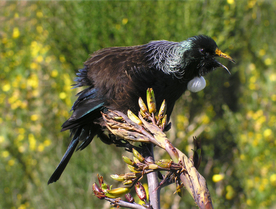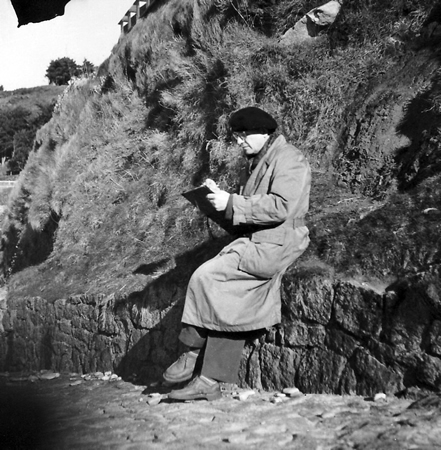Guest blog: a previously unheard work at the Proms
 photo: Tony Willis http://creativecommons.org/licenses/by-sa/3.0 via Wikimedia Commons
photo: Tony Willis http://creativecommons.org/licenses/by-sa/3.0 via Wikimedia Commons Un oiseau des arbres de Vie was originally intended as a movement for Éclairs sur l’Au-Delà... whose ninth movement is called Plusieurs oiseaux des arbres de Vie and whose third, which features his transcription of the Australian lyrebird, was originally to be called Un autre oiseau des arbres de Vie. The new movement is also a transcription of a single bird, the tui, a New Zealand species that Messiaen also evokes in Couleurs de la Cité céleste (1963) and the incomplete Concert à quatre (1991–92).
I found Oiseau Tui to have been fully completed in 3-stave score, Messiaen writing his customary ‘Bien’ along with indications of the desired orchestration. I have realised the orchestration following the sketches, a project generously supported by Birmingham Conservatoire’s French Music Hub and the Faculty of the Arts, Design and Media at Birmingham City University.

In his music, the sounds of the birds are filtered through Messiaen’s highly attuned, creative ear. Sometimes they are heard in a direct reflection of nature. This might be in portraits, as in the piano cycle Catalogue d’oiseaux (1956–58), or in the form of grand choruses, as in Réveil des oiseaux - Awakening of the birds - from 1953 or in the opera Saint François d’Assise (1975–83) where the saint preaches to the birds. Elsewhere, Messiaen creates artificial aviaries, bringing together species never heard together in the wild, as in Oiseaux exotiques (1955–56). He uses birdsong as ‘found material’, as symbols and metaphor and even, in the opera, as direct characters participating in the drama. However, it was only with the Lyrebird piece from Éclairs and Oiseau Tui that Messiaen wrote entire orchestral movements using nothing more than the sounds of a single bird.
So why was the tui omitted from Éclairs? We know that late in its gestation, Messiaen moved around several of the key movements of Éclairs, fundamentally altering the balance of the work in terms of both musical and theological structure. In the new layout of movements, Oiseau Tui lacked a clear purpose. However, Messiaen was clearly very attached to the movement as he resisted omitting it until a very late stage in the composition. Had he lived longer, I am certain it would have appeared in the context of another work. The bottom line is that, unlike many of the rediscoveries since his death, this piece finds Messiaen writing at the height of his powers. Moreover it was fully completed by him, just not orchestrated. While it is clearly by Messiaen, it also says something new. As such, it is a reminder that, for all he lived a long life, Messiaen still had much to say.
 RSS Feed
RSS Feed
